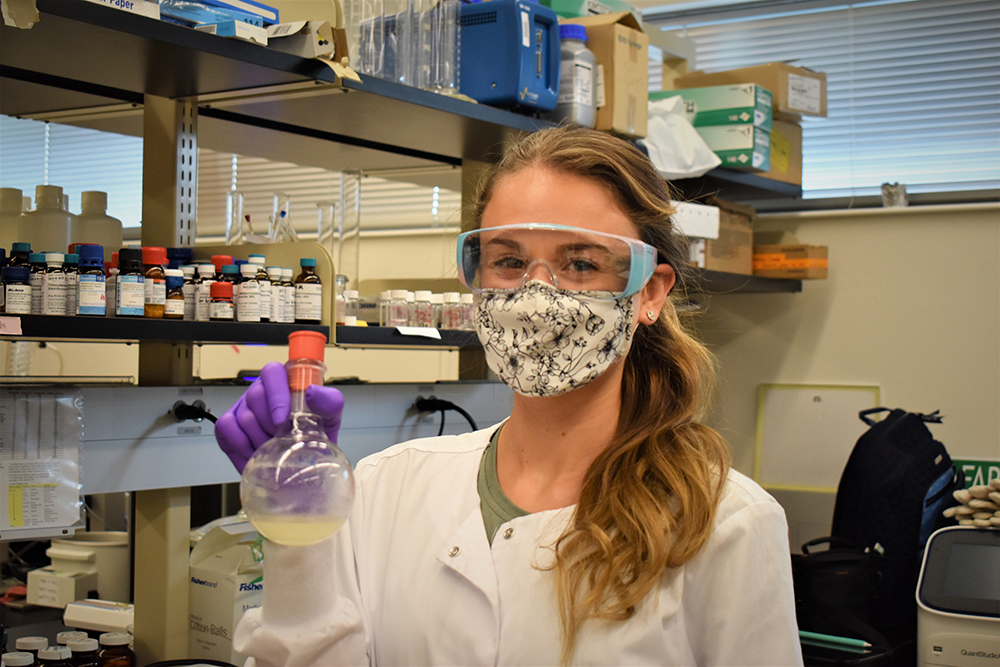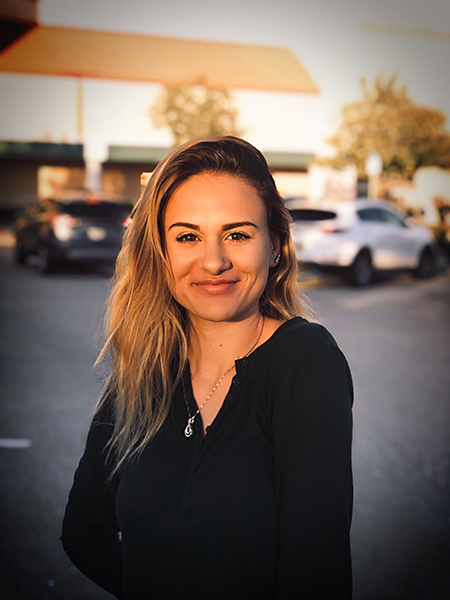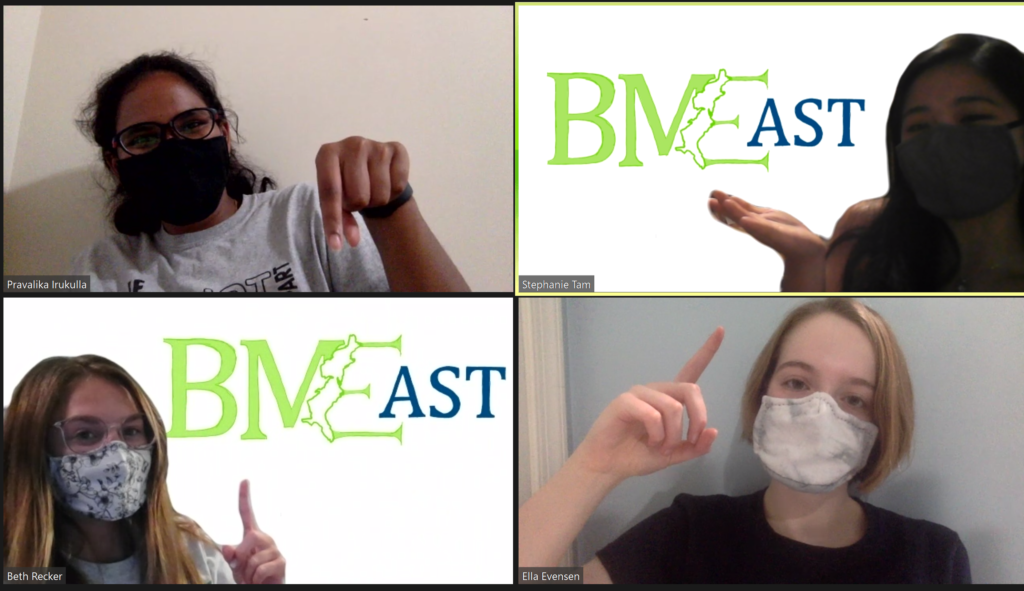
Elizabeth Recker took a leap of faith three years ago when she enrolled at Florida Gulf Coast University, but people who like to experiment and invent things tend to take chances like that.
In fact, considering how Recker managed to pick FGCU as her higher-education destination sight unseen from a considerable distance – about 240 miles away, from her home in Palm Coast, just north of Daytona Beach on Florida’s east coast – it’s little surprise that Recker would function brilliantly as a distance learner and researcher during the year COVID-19 forced education at all levels to go remote.
Recker, a junior bioengineering major who minors in biology and chemistry, is coming off a virtual internship with the Biomedical Engineering Alliance between Case Western Reserve University and the Cleveland Clinic that has proved rewarding in many ways. She became part of a four-woman team that created and marketed a do-it-yourself protective mask kit that placed second in a 126-team competition as part of the internship – a project that is still making an impact every time someone downloads the mask template in exchange for a donation to charity.
“We all worked twice as hard to perfect the product as fast as possible because we just could not wait to have a real product that could raise money for a great cause,” Recker said. “I believe we were the only team that raised money for charity with the design product and pitch competition.”
That’s how the BMEast Mask was created. The name is derived from the “BME” abbreviation for biomedical engineering, and the “East” part is a tribute to the four East Coast states the team members are from (Florida, Georgia, Massachusetts and Maryland). To learn all about it, you can view the pitch video Recker and her team created at this link. To get a copy of the 12-page protective mask template and instructions, make a donation at this GoFundMe page.
Recker’s team is currently donating all proceeds from kit sales to Doctors Without Borders after making an original contribution of $560 to the Centers for Disease Control Foundation. “Every $500 we are switching foundations to support, and we are listening to the feedback from our followers to pick the next foundation,” Recker said.
The “we” to whom Recker refers is the team she was part of with fellow-intern teammates Stephanie Tam from Worcester Polytechnic Institute, Pravalika Irukulla from the University of Georgia and Ella Evensen from the University of Maryland. The foursome joined more than 500 engineering undergraduates from top schools around the world who were chosen for the 10-week program. The internship culminated with the small group-based challenge to develop, design and test a solution to address the need for personal protective equipment to help mitigate the coronavirus pandemic, and the BMEast team nailed the project big time.
“My team was randomly grouped by the program staff,” Recker said. “It just so happened to be all girls, which was so awesome. We did a weekly Zoom call and got to know each other really well. Getting to know these amazing women was definitely my favorite part of the internship. Not only did we work really well together as a team, we established relationships with each other. More than just friendships, these are connections in the bioengineering field from all over the United States that we now have.”

Recker said her team immediately decided to redesign a mask from scratch. “We brainstormed for a few weeks and eventually landed on a solid idea after some research,” she said. “We found preliminary data from a study testing fabric types and their filtration efficiency. We decided to take what we learned from that publication and make a mask using the types of fabric that provided the best filtration possible without hindering breathability too much.”
Recker and her teammates then went to work creating prototypes – 17 in all. “It was really hard for all of us to find the same exact materials to create the prototypes in different parts of the nation, so we worked with what we had,” she said. “I was the team member who designed the shape of the template after seeing what kinds of masks were on the market and what I liked and disliked about the different shape structures.
“I sent the template to my team members, and we each made a prototype using the same template,” Recker continued. “Everyone agreed with the design for the shape, and then all that was left was determining exact measurements, type of elastics, and the sewing patterns. At the end we had created a completely customizable DIY mask that anyone can create at home for themselves.”
BMEast’s 12-page virtual template package contains everything one needs to make a customized mask at home, from the specific materials required to cleaning instructions. “After donating to our GoFundMe, we promptly email the document to the user and attach a letter from the BMEast team giving thanks for the donation.”
What gives Recker and her teammates the most pride is that while all student teams were instructed to create marketing plans and manufacturing proposals for their products, they were the only ones who went ahead and implemented their idea. “Many teams decided to take a theoretical approach. It was extremely important to us that this project did not end with the end of the internship,” Recker said. “We wanted to actually make something real that could truly help people.
“While brainstorming about marketing and how much we would theoretically sell the masks for, we had come up with the idea to make it a donation of the user’s choice to a COVID-related charity,” she continued. “Putting the money toward a foundation that could really make a big impact on the fight against COVID was an obvious choice for us to make.”
So that’s how the young woman who hopes to go on and earn a Ph.D. in biomedical engineering, then create her own company that specializes in integration of different STEM fields (“To imagine and create innovative products with a big impact on the world,” she said), spent her summer “vacation.”
To FGCU professors such as Dr. Arsalan Mirjafari, associate professor and Honors fellow in the Department of Chemistry & Physics, Recker’s research-and-production success as an undergraduate is no surprise.
After detailing an important research project Recker has conducted under his supervision – working with amino acid-based ionic liquid for direct capture of CO2 (carbon dioxide) from ambient air of various humidity levels, for those of you fascinated with science who want to know – Mirjafari profiled his highly unique student.
“Elizabeth is indeed an ‘original’ person – she goes beyond dreaming up the ideas and takes the initiative to make her visions a reality,” Mirjafari said. “She indeed champions ideas that are novel and useful, such as the mask.”
This “original person,” as Mirjafari describes Recker, is the product of a family she lovingly named as her only role models when asked – her engineer father, her sign-language interpreter mother, an aunt who’s a professor and fellow researcher, and her sister, Abigail, who’s “an inspiration to me because she is such a strong woman and constantly encourages me to strive to reach full potential,” Recker said.
She’s making that full-potential push at FGCU, where besides her impressive engineering education and undergraduate research opportunities, Recker is president of the FGCU Dance Company student club and a member of Delight Ministries, a student Bible discussion group — two activities where she spends most of her time outside the lab and classroom. “Getting plugged into a community at college has given me connections to other students, a creative outlet and valuable leadership experience,” Recker said.

The irony is that Recker confessed she had never even heard of FGCU when she was still deciding where to attend college during her senior year at Flagler Palm Coast High School on the state’s east coast. It was only through her student-athlete boyfriend’s interest in the Eagle baseball program that she became aware of FGCU’s existence. But she liked what she learned from a distance.
Her leap of faith has proven to be a jump for joy.
“While FGCU is a smaller school, the opportunities available to the students who do attend are enormous,” Recker said. “I am able to do undergraduate research with an amazing professor, Dr. Mirjafari. Through this, I have become a mentor to four high-school students who are part of a program where they are learning the importance of research and some techniques in the chemistry lab. We are planning on publishing a paper on a separate research project (the carbon dioxide experiment) I have been working on this academic year.
“I have met so many amazing professors at FGCU that have become my mentors. I would not want to go to any other school for my bachelor’s degree,” Recker said. “I am so proud to be an FGCU Eagle.”